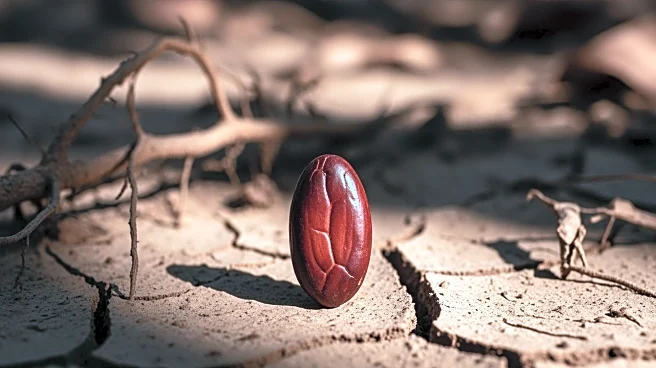What's Happening?
Researchers at MacEwan University have developed Agrilo, a low-cost soil testing sensor paired with a smartphone app, aimed at providing farmers with real-time guidance on fertilizer use. This innovation seeks to address the challenges of rising fertilizer costs, climate change, and the need to reduce emissions. Agrilo offers a suite of sensors for various soil properties, allowing farmers to optimize fertilizer use, improve crop yields, and reduce environmental harm. The tool has been validated in peer-reviewed research and is designed to be both affordable and accessible, opening opportunities for farmers globally.
Why It's Important?
The development of Agrilo is significant as it addresses multiple challenges faced by the agriculture industry, including high fertilizer costs, environmental degradation, and the need for sustainable practices. By optimizing fertilizer use, Agrilo can help reduce greenhouse gas emissions and improve soil health, contributing to more sustainable farming practices. This innovation not only benefits farmers economically by reducing waste and costs but also supports global efforts to combat climate change and food insecurity. The tool's affordability and accessibility make it a valuable resource for farmers worldwide, including those in developing regions.
What's Next?
The research team is continuing to refine Agrilo and is testing the platform with farmers and partners in various countries. They are also building partnerships with schools and international organizations to use Agrilo as both a farming tool and an educational resource. The goal is to make precision agriculture accessible to all farmers, enabling them to contribute to sustainable food production and environmental protection. As the tool gains traction, it could play a crucial role in helping countries meet their climate goals and address the challenges of feeding a growing global population.
Beyond the Headlines
Agrilo's potential extends beyond agriculture, serving as an educational platform that connects textbook science to real-world environmental challenges. By making soil chemistry and sustainability tangible, Agrilo can enhance applied science learning in classrooms, fostering a deeper understanding of food security and ecosystem health. This educational aspect highlights the broader impact of Agrilo in promoting environmental awareness and sustainable practices among future generations.










